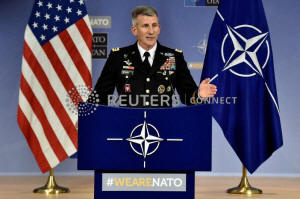Helping veterans develop business skills as entrepreneurs
 Send a link to a friend
Send a link to a friend
 [November 12, 2019]
By Lauren Young [November 12, 2019]
By Lauren Young
NEW YORK - Every year, about 250,000 U.S.
military members leave the service and enter the workforce, and one in
five tries to start their own business.
While the military focuses on leadership development, entrepreneurship
is not a top priority, says General John W. Nicholson Jr., a retired
four-star general who last commanded U.S. Forces in Afghanistan and
NATOís Resolute Support Mission.
Nicholson, who now serves as the president of the PenFed Foundation, a
Washington, DC-based non-profit, talks about the value of providing seed
capital to veterans who want to become entrepreneurs.
Q. Why do military veterans need help launching businesses?
A. Age is one thing. If someone enters the military straight out of high
school and serves for a 20-year career, they could be as young as 38 or
39 when they retire. Many service members leave in their 30s.

You are typically getting a young man or woman with leadership
experience. They are physically fit. They are problem solvers. They have
worked with adversity. These are people who have dealt with complex and
dangerous tasks in tough conditions.
They bring a lot of good qualities to the table: leadership, drive,
energy, and, quite often, great ideas. What they donít have is financial
acumen and capital. They are not used to translating a good idea into a
business plan.
Q. How does PenFed's Veteran Entrepreneur Investment Program work?
A. We provide the seed capital to help veterans build and grow their
businesses. We work with them every step of the way, from the idea stage
to the point where it can be translated it into a feasible plan as well
as an investment for us.
Our goal is to select about 20 companies per year for a one-year period
to help incubate them and get started. At the end, we select a handful
and give loans of up to $300,000 for their businesses. Then they repay
loan, and we reinvest the money in another veteran entrepreneur's
business.
Q. Are certain industries better for veterans?
A. When we think of the military, we think of someone pulling a trigger,
flying a jet or firing a missile. The truth is that 85% of military jobs
are in support function roles, such as cybersecurity, human resources or
logistics. The trigger pullers are in the minority.
[to top of second column]
|

U.S. General John Nicholson holds a news conference after a North
Atlantic Council (NAC) defence ministers meeting in Brussels,
Belgium November 9, 2017. REUTERS/Eric Vidal/File Photo

We have helped veterans launch businesses in many different kinds of
industries, including technology and even food. One example is Abe
Kamarck, a former Navy pilot, who started True Made Foods. His kids
liked barbecue sauce and ketchup, but the products were loaded with
sugar. He read the labels and endeavored to make a product with
natural ingredients his own children would eat. We invested early,
and now he is distributing nationwide.
Q. Veterans are 30% more likely to employ other veterans, according
to your web site. Why is that?
A. There is a shared culture and shared values within the veteran
community. We all serve. Hard work and a focus on others is at the
center of it. Veterans also know that when it comes to problems,
they have the stamina and will to push through.
Q. How much financial experience do most veterans have?
A. Not enough. The No. 1 stressor for the majority of military
members after combat is money. Military families generally live
close to their means. They endure separations from loved ones, and
they often move around a lot. More than half are married, and they
are raising young families.
Q. Female veterans have an even harder time launching a business.
Why?
A. Women, in general, have a lower level of investment in their
businesses. And yet women are the fastest-growing cohort within the
veteran community - they represent almost 10 percent of all retired
military. We are trying to get more businesses going. It's one area
where we need to do more work.
One success story is Suzie Mills, a retired Air Force veteran. She
founded Honest Soul Yoga and she employs military spouses in the
Washington, DC-area. Now she is expanding to San Antonio, Texas.
(Reporting by Lauren Young; Editing by Dan Grebler)
[© 2019 Thomson Reuters. All rights
reserved.]
Copyright 2019 Reuters. All rights reserved. This material may not be published,
broadcast, rewritten or redistributed.
Thompson Reuters is solely responsible for this content.
 |